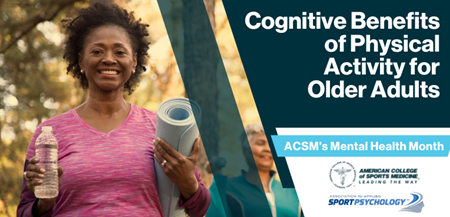Jean-Charles Lebeau, Ph.D., CMPC |
May
20, 2022
 Physical activity improves both physical and cognitive health, especially among older adults. Cognitive health encompasses many aspects of our daily functioning: memory, maintaining attention and concentration, dealing with distractions, solving problem and making decisions. Those cognitive functions tend to decline as we age, and physical activity can greatly prevent cognitive decline. For example, a meta-analysis has shown that adults participating in higher levels of physical activity had a 38% lower risk of cognitive decline in follow-up years. For low to moderate activity, there is still a 35% lower risk of cognitive decline. So, the message is simple: any physical activity can help. No need to lift heavy weight at the gym or run marathons to reap the benefits. For those looking at a more specific program that could be done at the gym, an example could be five to seven movements at 60-80% 1 RM, two sets, with two minutes rest, twice a week. For older adults with more limited mobility, some exercise with resistance band, or/and with a chair can be helpful. Aging is also associated with arthritis, so doing exercises that require fine motor skills with fingers can help maintain finger joint function. This is especially important for being able to grab and manipulate small objects such as silverware or a pen or opening a water bottle. Ideally, an exercise program for older adults should include some aspects of aerobic and resistance training, along with balance exercises to prevent falls.
Physical activity improves both physical and cognitive health, especially among older adults. Cognitive health encompasses many aspects of our daily functioning: memory, maintaining attention and concentration, dealing with distractions, solving problem and making decisions. Those cognitive functions tend to decline as we age, and physical activity can greatly prevent cognitive decline. For example, a meta-analysis has shown that adults participating in higher levels of physical activity had a 38% lower risk of cognitive decline in follow-up years. For low to moderate activity, there is still a 35% lower risk of cognitive decline. So, the message is simple: any physical activity can help. No need to lift heavy weight at the gym or run marathons to reap the benefits. For those looking at a more specific program that could be done at the gym, an example could be five to seven movements at 60-80% 1 RM, two sets, with two minutes rest, twice a week. For older adults with more limited mobility, some exercise with resistance band, or/and with a chair can be helpful. Aging is also associated with arthritis, so doing exercises that require fine motor skills with fingers can help maintain finger joint function. This is especially important for being able to grab and manipulate small objects such as silverware or a pen or opening a water bottle. Ideally, an exercise program for older adults should include some aspects of aerobic and resistance training, along with balance exercises to prevent falls.
Studies with older adults have shown that physical activity specifically impacts executive functions. Executive function refers to processes that control, direct and coordinate other lower cognitive processes and goal-directed behaviors associated with the frontal lobe. Examples of tasks requiring executive function include scheduling, inhibition, planning, working memory, problem solving and task switching. Those skills are critical for the activities of daily living, and this is why physical activity can help prevent cognitive decline and promote healthy aging.
How does exercise impact cognitive functioning? Mechanisms are still being investigated but the main ones with empirical support include improvements in cardiovascular function and the associated influence on the cerebrovascular system, reduction in stress and anxiety, reduced inflammation and improved insulin sensitivity. When focusing on the brain, molecular and cellular mechanisms are the two main explanations for improved cognitive functions. Regarding molecular mechanisms, being physically active increases brain-derived neurotrophic factors, which regulates synaptic plasticity and memory. Exercise also alleviates growth factors such as insulin-like growth factor and vascular endothelial growth factor, important for vascular health. Exercise also improves cognitive functioning via cellular mechanisms. Specifically, exercise promotes neurogenesis (development of new neurons) and synaptogenesis (formation of synapses). Those molecular and cellular benefits are also associated with neuroelectric changes. Indeed, it appears that increased fitness and greater participation in long-term exercise is associated with a larger P300 amplitude (more attention resources) and shorter P300 latency (faster information processing), but more studies are needed to provide more definitive recommendations.
What activities should be considered for older adults? Any activity that is safe and enjoyable. This could include walking, gardening, dancing, swimming, biking or any other activity that gets them moving. The best activity is the one that is enjoyable, and often doing it with other people helps to make it more fun. Being active with others also helps with cognitive benefits and mood as social interactions are important for healthy aging. If you cannot find anyone to exercise with, walking your dog could also be a good way to make yourself accountable and integrate physical activity in your daily routine.
Jean-Charles Lebeau, Ph.D., CMPC, is an assistant professor of sport and exercise psychology in the School of Kinesiology at Ball State University. He is also a Certified Mental Performance Consultant® through the Association for Applied Sport Psychology.